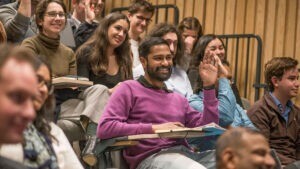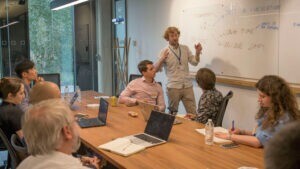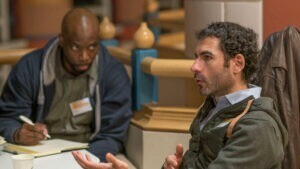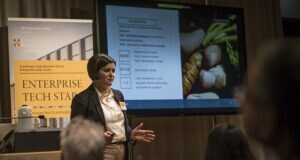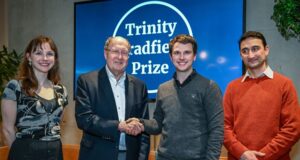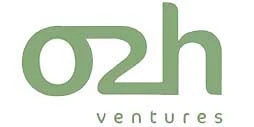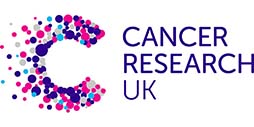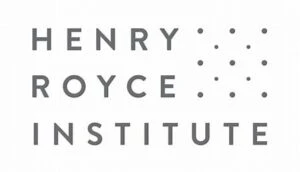The EnterpriseTECH programme
A transformative 10-week programmes tailored for researchers looking to grow their understanding of entrepreneurship and the processes, theory and practice of taking early-stage tech to market.
Programme details
EnterpriseTECH 17
Programme dates
23 September – 26 November 2025
Application deadline
10 July 2025
Format
Part-time
Location
Cambridge/online
EnterpriseTECH 18
Programme dates
27 January – 15 April 2026
Application deadline
10 November 2025
Format
Part-time
Location
Cambridge/online
About the EnterpriseTECH Experience
The EnterpriseTECH experience encompasses the foundation level EnterpriseTECH offering a dynamic blend of education and practical experience tailored for the entrepreneurially-minded STEM researcher or professional.
On this 10-week programme, you’ll learn core aspects of entrepreneurship, innovation-driven problem-solving, strategic market navigation and value creation, while exploring your entrepreneurial potential in a team that has a project provided.
By joining EnterpriseTECH, you become part of an innovative community where learning translates into real-world applications for early-stage technologies and ventures. Whether you come to us as a student, an inventor with a technology to share in the form of a project proposal, or a professional keen on guiding the next generation of entrepreneurs as a supervisor, our programmes offer a unique platform to learn, engage, contribute, and grow.
EnterpriseTECH is ideal for people new to business school learning, who have other weekday commitments to attend to. You may be looking for an easy-to-access educational offering or primer without committing to a full Masters degree or MBA in business or entrepreneurship studies.
Why study entrepreneurship at Cambridge Judge Business School?
You won’t just learn about entrepreneurship; you’ll immerse yourself in a world-class environment for innovation and enterprise. As part of a renowned research university, we leverage unparalleled academic and practical expertise from across the Cambridge ecosystem.
Our programmes are distinguished by their depth, diversity, and direct connection to the heart of Silicon Fen—a global epicentre of entrepreneurial dynamism, technological innovation, and groundbreaking research.
Joining EnterpriseTECH offers you the opportunity to:
- Learn from the experts: Engage with faculty who research entrepreneurship and entrepreneurs who live it, experiencing firsthand one of the world’s leading hubs for technological genius and entrepreneurial spirit.
- Connect with brilliant minds: Become part of an ecosystem renowned for over eight centuries of inspiring excellence, driving innovation, and creating impact. Here, networking and socialising with peers and experts from various backgrounds can foster opportunities for collaboration and personal growth.
- Be part of a diverse community: Join a cross-disciplinary, inclusive community where the fusion of ideas and diverse perspectives fuels innovation and entrepreneurial success.
Our offering
EnterpriseTECH
EnterpriseTECH provides a foundation in entrepreneurship focusing on education and real-world experience. Delivered over 10-week experience, the programme combines a four-day lecture intensive with hands-on (supervised) team projects. You’ll learn to:
- research and analyse the commercial viability of a real-world technology
- craft and present a persuasive funding pitch for a technology idea
- produce compelling video marketing content
Inventors: Submit a project proposal to EnterpriseTECH
Got an early-stage technology? We encourage inventors with technologies in development to submit project proposals to EnterpriseTECH.
Having your project selected offers a unique opportunity to collaborate with student teams as they work on a commercial feasibility assessment for you, as part of their learning experience.
Become a supervisor
Join our network to guide students on their entrepreneurial paths. It’s a chance to share your expertise, enhance your coaching skills, and expand your professional network within the Cambridge entrepreneurial ecosystem.
We found the commercial feasibility report and interviews by the Cell- Lock team highly illuminating, giving important new directions as we develop this technology to help us move towards a spinout.
Personal ambitions in entrepreneurship
Our surveys reveal that over 95% of our students are drawn to EnterpriseTECH and entrepreneurship not primarily for financial gain but by a strong desire for autonomy and making a meaningful impact.
They aim to address critical global challenges, enhance sustainability, combat the climate crisis, improve health, and better the quality of life for all. Many researchers are motivated by these same goals when they first enter the field.
The programmes offer crucial first steps towards realising these ambitions, providing essential knowledge and networking opportunities to help you turn future business ideas or research into tangible solutions.
Stay updated
Keep abreast of the latest calls for project proposals, programme application deadlines and student and venture news by signing up to the EnterpriseTECH mailing list.
Women entrepreneurs solving some of the world’s most pressing challenges
In a world clamouring for innovation and sustainability, 4 women entrepreneurs stand out, not just for their ground-breaking solutions but for the resilient spirit they embody.
Cambridge Judge Entrepreneurship Centre alums win 2024 Trinity Bradfield Prizes
3 biotech businesses founded by alumni of Cambridge Judge Entrepreneurship Centre programmes have been awarded the top three spots at the prestigious Trinity Bradfield Prize competition run by the Bradfield Centre and Trinity College, University of Cambridge.
Zijing Li’s self-healing concrete invention wins UKRI award as Mimicrete takes off
From civil engineering researcher to award-winning construction materials entrepreneur, Mimicrete’s transformative potential for the construction industry gains traction.
Our sponsors
Our valued academic partners and corporate sponsors that support our programmes as well as enable some our aspiring researcher-entrepreneurs to attend include:


